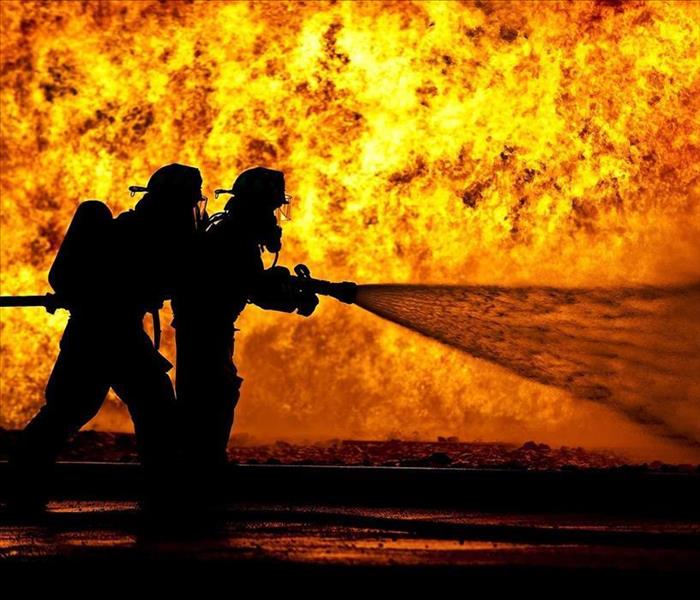Recent Fire Damage Posts
Fire Damage Restoration in Greenville, NC: How to Choose the Right Service Provider
3/20/2023 (Permalink)
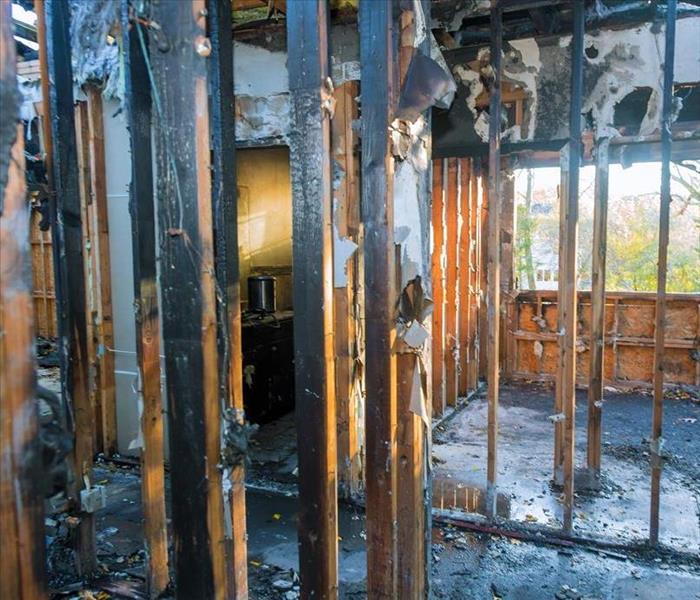 Fire damage in Greenville, NC can be devastating. Call the professionals at SERVPRO of Greenville to help!
Fire damage in Greenville, NC can be devastating. Call the professionals at SERVPRO of Greenville to help!
If your property has been damaged by fire, you need to act fast to prevent further damage and restore your property to its preloss condition. However, choosing the right fire damage restoration service provider can be challenging, especially if you're not familiar with the process. In this blog post, we'll share some tips on how to choose the right fire damage restoration service provider in Greenville, NC.
Look for local providers: When searching for fire damage restoration services in Greenville, make sure to prioritize local providers. Local providers are more familiar with the local area, local building codes and regulations, and can respond to emergencies more quickly than providers from other areas.
Check for certification: Make sure that the fire damage restoration service provider you choose is certified by the Institute of Inspection, Cleaning and Restoration Certification (IICRC). Certification ensures that the provider has the necessary training, equipment, and expertise to handle fire damage restoration.
Check for insurance: Make sure that the fire damage restoration service provider you choose has liability insurance and workers' compensation insurance. This protects you from liability in case of accidents or injuries that occur during the restoration process.
Look for experience: Choose a fire damage restoration service provider with a proven track record of successfully restoring properties damaged by fire.
Check for 24/7 availability: Fire damage can occur at any time, and you need a service provider who is available 24/7 to respond to emergencies quickly. Make sure that the fire damage restoration service provider you choose can respond when you need them.
If you're searching for fire damage restoration services in Greenville, NC, SERVPRO® of Greenville is Here to help. ® We specialize in fire damage restoration and have decades worth of experience helping property owners restore their properties to preloss condition. Contact us today to learn more about our services.
Protect Your Family: Five Steps For Fire Safety
8/19/2022 (Permalink)
 Keeping your family safe is a top priority. Let preventative steps like these assist you.
Keeping your family safe is a top priority. Let preventative steps like these assist you.
While you likely take steps to prevent fires in your Greenville home, sometimes things happen that are out of our control. In those instances, you need to already have a plan in place. Here are five things you can do to be ready should there be a fire in your home:
1. Maintain your smoke alarms properly. This includes making sure your smoke alarms are in the proper places, have fresh batteries, and are tested at least once a month to make sure they are ready to alert you in case of danger.
2. Ensure you have an exit plan. Develop an exit strategy with your family. Keep in mind that you should have at least two exit options so that if a fire is blocking one, there is another option for everyone to use. Make sure everyone in your household knows these exits like the backs of their hands.
3. Have emergency contacts. Picking an emergency contact is vital to ensure the safety of your entire family, especially if a family member were to get separated. Make sure that your kids especially memorize the phone number of a neighbor, or a family member who lives close to ensure that they have a safe place to go.
4. Practice. Practice makes perfect when it comes to fire safety. During a real fire, emotions or panic can make it difficult to think. You should run drills every four to six months, so that, in the event of a fire, everyone knows what to do like second nature, despite the emotions and panic.
5. Calling 911. Make sure everyone in the family knows to call 911 and can recite their address so the first responders can get there as soon as possible.
Of course, if there is a need for assistance after a fire occurs, leading experts such as those at SERVPRO of Greenville can help get your life back in order.
Understanding the Fire Mitigation Process
5/26/2022 (Permalink)
 Like all good processes, many things must come together to make the most of a situation.
Like all good processes, many things must come together to make the most of a situation.
What to Expect After a Fire
1. Assessment
The first thing specialists must do is get a clear picture of the extent of the damage. They walk through your home, making note of fire, water, and smoke damage that needs to be mitigated. At the end of this visit, they compile an itemized list of tasks and can try to formulate a general cost and timeline for the work needed.
2. Removal
Before technicians can repair salvageable items, they must remove everything that needs to be thrown out. Even if something can be saved, it still needs to be removed so that they can work on repairs. Personal belongings must be removed and either set aside for cleaning or discarded.
3. Cleaning
After all destroyed materials have been removed, a thorough cleaning is in order. A big part of fire restoration is cleaning not only the soot and smoke left by the fire but also the water damage that happened from the fire being put out. Every surface must be disinfected before new materials can be brought in.
4. Restoration
Once damage cleaning is done, technicians can build on the existing structure to restore your property. New drywall can be added and painted to match the rest of the area. New tile and flooring can be installed. Finally, items that were able to be restored can be moved back into the space.
A home fire may cause a lot of damage, but most homes can be repaired to preloss conditions. The fire restoration process starts with assessment and mitigation. Then, technicians take the steps necessary to return your home to all of its former glory.
What To Expect From the Content Cleaning Process, Including Dry-Cleaning and Other Techniques
3/16/2022 (Permalink)
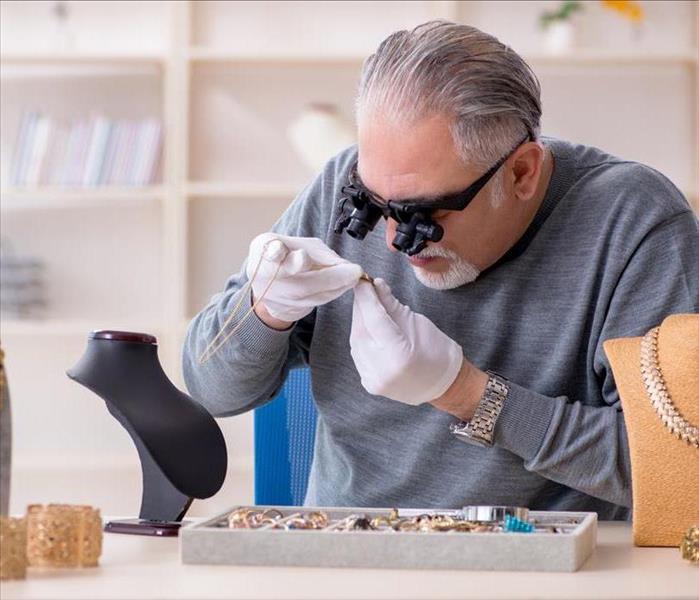 Know more about the Content Cleaning Process, and avoid Fire Damage in your Greenville, NC home.
Know more about the Content Cleaning Process, and avoid Fire Damage in your Greenville, NC home.
The destruction that follows after a fire in your home can disrupt your life for months. However, cleanup and recovery professionals in Greenville, NC, can speed up the recovery process and help you set your sights on a hopeful future. While repairs and reconstruction are underway on your home, professionals will also be busy taking care of the content cleaning, using methods such as dry-cleaning and other techniques:
- Spray and wipe cleansers
- Foam, immersion, and abrasive cleaning
- Specialized preservation services
If you aren't directly involved with the cleaning and recovery, it may be difficult to see progress. When you know what to expect, however, it's easier to wait for completed services.
The Content Cleaning Process From Dry-Cleaning to Heirloom Restoration
Assessing the extent of damage is one of the most important steps professionals can take. It is during this step that cleaning and restoration professionals determine which methods are best for the contents of your building. The various items in your home require unique cleaning attention.
A lot of your clothing, sheets, laundry, and other fabric belongings can be run through a high-capacity washing system or sent through a dry-cleaning facility. Other fabrics, such as upholstery and expensive carpets, require a gentle touch and expert handling. Appliances and other electronics require a different type of expert response, and valuable books and paperwork need yet another expert.
If you have jewelry, artwork, and heirlooms, you may be comforted knowing that the technicians handling your belongings have thoroughly inspected your items and planned for the appropriate care.
Separate Belongings by Cleaning Technique
Once the assessment is complete and the content cleaning plan is in place, the next step is sorting and storing the belongings. You may expect the sorting part of this step, but you may have questions about the storage of some of your items. Content storage is a vital part of properly caring for fragile or sensitive items.
For example, cherished journals from ancestors or paperwork that holds great sentimental value for you will be placed in frozen storage before document restoration experts begin their work.
It's important that the quality of the books and papers is protected before methods, such as vacuum thermal drying and dehumidification are used. Computers and similar devices may also be stored in specialized areas to reduce damage from humidity or soot buildup.
Clean Items With Appropriate Techniques
The cleaning part of this process may not happen immediately because of the important steps before it, but once this step is reached, it may move forward quickly. Upholstered items may be treated with foam cleaners and abrasive techniques could be used on belongings with tough stains. Steps will be taken to ensure that smoke odors are removed and that your belongings are free of soot and chemicals.
Return Cleaned and Restored Contents to Home Owner
Throughout the content cleaning step, the technicians will keep careful records of your inventory. This is to ensure that you don't lose any more of your belongings than have already been lost.
The recovery from a home fire is a rough road, but with cleaning techniques from dry-cleaning your curtains to the expert treatment of valuable artwork, professionals can help you have a smoother experience.
Checklist of Items To Throw Away After a Fire
2/24/2022 (Permalink)
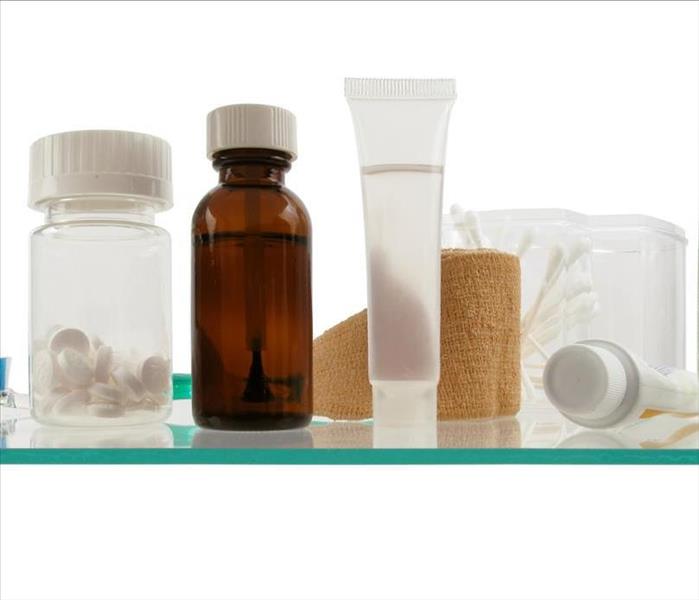 Learn More about which Items To Throw Away After a Fire. If you have more questions, just contact us.
Learn More about which Items To Throw Away After a Fire. If you have more questions, just contact us.
If there is a fire in your home in Greenville, NC, many of your belongings may be able to be cleaned and saved. Draperies and other fabric can be cleaned and sometimes furniture can be salvaged. Fire restoration experts may even be able to get your electronics that don't come into direct contact with the flames back in working order. There are certain items, however, that you should always throw away after a fire, even if they look OK.
What should I Throw Away after a Fire?
Throw Away Food
A home fire can ruin the food in your kitchen, fridge and pantry, even if the fire was in a different room. These items may have smoke or soot damage, and that's not something you want your family to ingest. Additionally, high heat can spoil the food even if the outer packaging is intact. Go through your pantry first and toss vulnerable items:
- Bulging cans
- Open packages
- Anything with visible soot or extinguisher residue
- Burned or melted containers
You should definitely get rid of any food items that are on the counter or out in the open. Don't assume that a closed refrigerator door offers enough protection against the fire, especially if the power was off for several hours. It's better to throw out food that may be spoiled than to take the risk of eating it.
Toss Out Cosmetics
Your skin is your biggest organ, and its purpose is to protect you from toxins. What you put on your body is just as important as what you eat. Therefore, it makes good sense to use similar guidelines when going through toiletries and cosmetics after a fire. Throw away anything that has been subjected to high temperatures. Such an environment can alter the chemical makeup of cosmetics, causing them to spoil. Anything in a burned package should be thrown out as well.
Don't stop at your makeup bag. Go through any cleansers, moisturizers and skin treatments you find. Toothpaste and mouthwash may also be compromised. Check the items in your shower, particularly if you know that the room was subject to a significant increase in temperature. Once again, it's better to err on the side of caution when deciding which cosmetics to toss.
Get Rid of Medication
Your medicine cabinet requires special attention, especially if it is located near the area of your home that sustains the most fire damage. Throw out any pills or tablets that you find. Topical creams and ointments should be tossed as well.
You may be able to salvage some bandages in your first aid kit, as long as they don't smell like smoke and show no signs of damage. If your inspection reveals any issues, however, throw them away. Make a list of everything you have to get rid of so that you can include it on the insurance claim.
It may be disheartening to have to throw away so many items after a fire. However, it's better to replace everything than risk the consequences of contaminated food, cosmetics or medication. If you don't know what to do with a particular item, the mitigation team can help you decide.
Can Contents Be Save After a Fire?
1/6/2022 (Permalink)
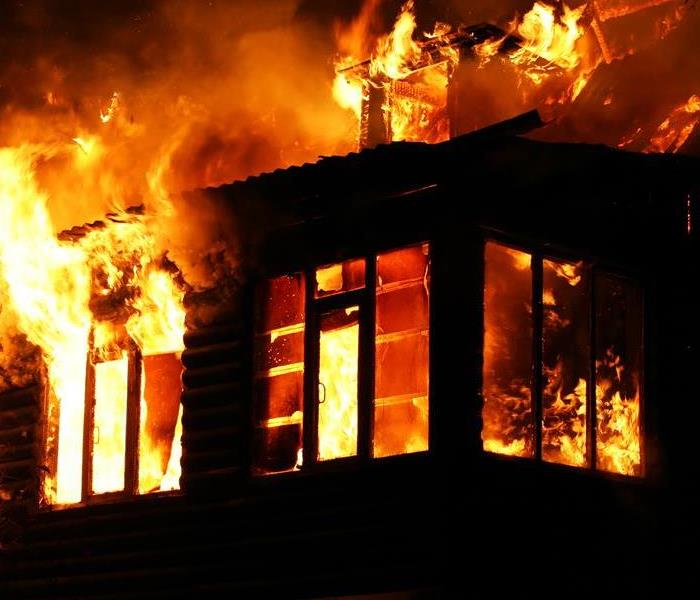 Follow these tips to find out what items to keep after a Residential Fire.
Follow these tips to find out what items to keep after a Residential Fire.
One of the most difficult decisions for homeowners who have experienced a house fire is deciding whether to repair or replace contents. Some items can be restored by dry-cleaning or other methods, while others need to be replaced.
Which Contents Can Be Restored With Content Cleaning?
Most homes can be restored after a fire unless there is structural damage. However, it isn't practical to restore some contents.
Consider these tips to know what items to keep after a Fire
Which items can be saved and which should you toss out?
1. Clothing, Upholstered Furniture and Other Fabric Items
Fabric items that have been burnt may not be able to be saved, though it may be possible to recover some upholstered items that only have damage to the fabric covering. Items that have smoke damage, but have not been damaged by flames may be able to be cleaned by dry-cleaning or other methods. Dry these items as quickly as possible to prevent mold growth. Consider using content storage while your home is being repaired.
2. Electronics
If the internal electronic components have not been damaged by heat or water, electronics can often be saved. However, the cost to repair water-damaged electronics is usually higher than replacing the items.
3. Wood Furniture
If your wood furniture is wet due to the water used to fight the fire, dry it quickly to avoid warping. Smoke and soot damage can usually be cleaned. If the wood is charred from the flames, you may need to replace the item.
4. Non-Perishable Food
Food in open containers or stored in cloth, cardboard or thin plastic bags should be discarded. Items in sealed cans may be OK, but if those items were exposed to high temperatures the contents may spoil or develop an unpleasant taste. In general, it is better to throw out any food items that you can't be sure did not come in contact with high heat or chemicals.
5. Perishable Food
Refrigerated or frozen food may be safe to eat if it was maintained at a safe temperature and your refrigerator or freezer was not damaged by the fire. A refrigerator without power can keep food safe for about four hours. Throw out perishable food if you find any signs of smoke or soot damage in the refrigerator, the power went out for six or more hours, the food smells off or frozen food is no longer hard and cold.
6. Cosmetics and Medicine
If you find any signs of smoke, soot or other damage, throw these items out. If the items were stored in an area that was not damaged by flames, high heat, smoke or chemicals they may be safe.
7. Documents and Photos
Items made from paper are among the most vulnerable to fire damage. However, important documents and photos may be restorable in some cases. Contact a fire remediation company in Greenville, NC, if you have valuable documents and photos you want to try to restore.
When making decisions about whether to keep contents or throw them out, it is important to consider whether it is possible to clean items through dry-cleaning or another method. You should also consider the cost of restoring items versus the cost of replacing them.
Get Rid of Unwanted Smells With Professional Home Deodorization
10/23/2021 (Permalink)
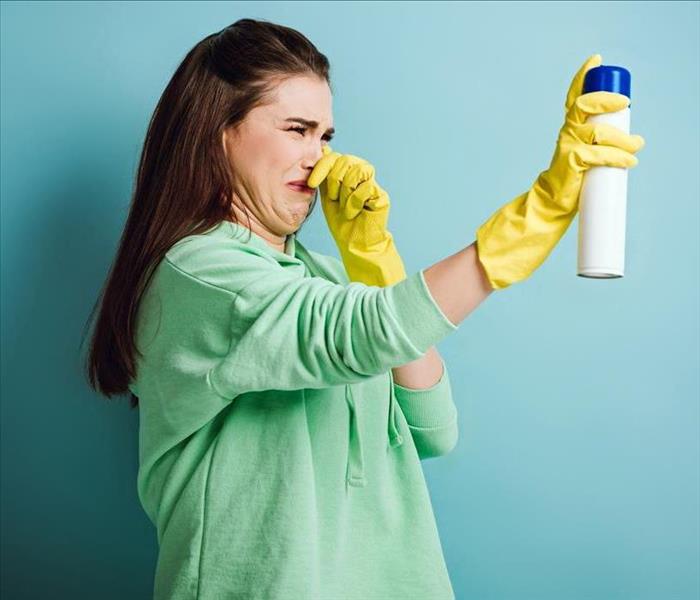 Deodorize and clean properly to get rid of the odor in your Greenville, NC, home.
Deodorize and clean properly to get rid of the odor in your Greenville, NC, home.
Many things can cause odors in your home, and even with a thorough cleaning, smells may lurk where you can't find them. Successful home deodorization involves three basic steps:
- Identify the sources
- Treat the smells
- Prevent new odors
Don't wait to tackle unwanted smells in your Greenville, NC, home. The sooner you take action, the less time the funk has of settling deep into mattresses, carpets, walls, and appliances.
Prepare for Successful Home Deodorization
If you don't know where smells originate, it's difficult to get rid of them. The following list of common sources of unpleasant odors could help you figure out where to get started:
- Bits of old food and trapped moisture in the dishwasher or the disposal
- Sticky spills and moldy leftovers in the refrigerator
- Carpets and padding that have absorbed dust, pet dander, and body odors
- Mattresses, sheets, and blankets that haven't been washed
- Closets full of funky clothes and shoes
- Bathrooms, laundry rooms, and mudrooms
- Laundry appliances
- Lingering cigarette smoke
Some disagreeable whiffs are a symptom of deeper trouble. For example, a musty smell could signal a clog or broken pipe in your water line. Rodents can leave your home smelling like a wet dog, and a smoky or electric smell could be a symptom of frayed wiring. Once you know where to find unwanted odors, you can take steps to successfully deodorize your home.
Plan Professional Treatment for the Source of the Problem
Identifying the source of unpleasant odors is just the first step in the home deodorization process. Sometimes, homeowners pick up candles and other air fresheners in attempts to mask smells. As noted above, however, unexplained odors often present real concerns about physical damage. Even if you have found the cause of strange and unpleasant odors, a professional response may be the best approach for treatment. There are several reasons to hire an odor cleanup and deodorization company:
Smelly mold requires specialized treatment.
- Using the wrong cleaner could cause further damage.
- Masking, rather than treating smells, allows original causes to get worse.
- Experts have the latest equipment and technology.
- Professionals have the equipment to remove allergens and bacteria.
- Comprehensive cleaning extends the life of carpets and padding.
It isn't easy to thoroughly clean everything that could cause a funk in your home, and professional treatments generally last longer than DIY efforts.
Develop New Habits of Preventative Cleaning
While professional treatment for odors in your carpets, appliances, and structural elements of your home is best, there are some preventative steps you can take to improve the atmosphere of your home. Naturally, many of these steps focus on cleaning tasks:
- Take out the garbage regularly
- Clean out your fridge
- Wipe down appliances, inside and out
- Open doors and windows for fresh air
- Install an air purifier
- Bathe and brush pets
- Run laundry frequently
Remember, an effective home deodorization process begins by knowing where smells are most likely to originate. Regularly schedule professional cleaners to freshen up carpets, deal with smells that are warning signs, and treat hard-to-combat smells, such as cigarette smoke. Finally, develop housekeeping habits that target some of the most common trouble spots throughout your home.
Greenville Smoke and Soot Cleanup
9/13/2021 (Permalink)
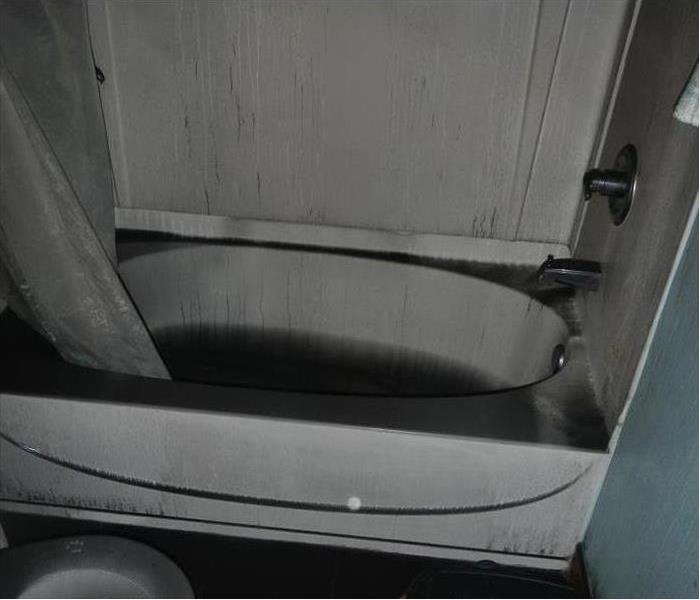 Smoke and Soot Damage Can Cause a Pervasive Odor in Your Greenville Home
Smoke and Soot Damage Can Cause a Pervasive Odor in Your Greenville Home
Smoke and soot are very invasive and can penetrate various cavities within your home, causing hidden damage and odor. Our expertise in smoke damage remediation allows us to inspect and accurately assess the extent of the damage to develop a comprehensive plan of action.
Smoke and soot facts:
- Hot smoke migrates to cooler areas and upper levels of a structure.
- Smoke flows around plumbing systems, seeping through the holes used by pipes to go from floor to floor.
- The type of smoke may greatly affect the restoration process.
Different Types of Smoke
There are two different types of smoke–wet and dry. As a result, there are different types of soot residue after a fire. Before restoration begins, SERVPRO of Greenville, NC, will test the soot to determine which type of smoke damage occurred. The cleaning procedures will then be based on the information identified during pretesting. Here is some additional information:
Wet Smoke – Plastic and Rubber
- Low heat, smoldering, pungent odor, sticky, smeary. Smoke webs are more difficult to clean.
Dry Smoke – Paper and Wood
- Fast burning, high temperatures, heat rises therefore smoke rises.
Protein Fire Residue – Produced by evaporation of material rather than from a fire
- Virtually invisible, discolors paints and varnishes, extreme pungent odor.
Our Fire Damage Restoration Services
Since each smoke and fire damage situation is a little different, each one requires a unique solution tailored for the specific conditions. We have the equipment, expertise, and experience to restore your fire and smoke damage. We will also treat your family with empathy and respect and your property with care.
Keep Your Furnace Happy With Simple Maintenance
8/23/2021 (Permalink)
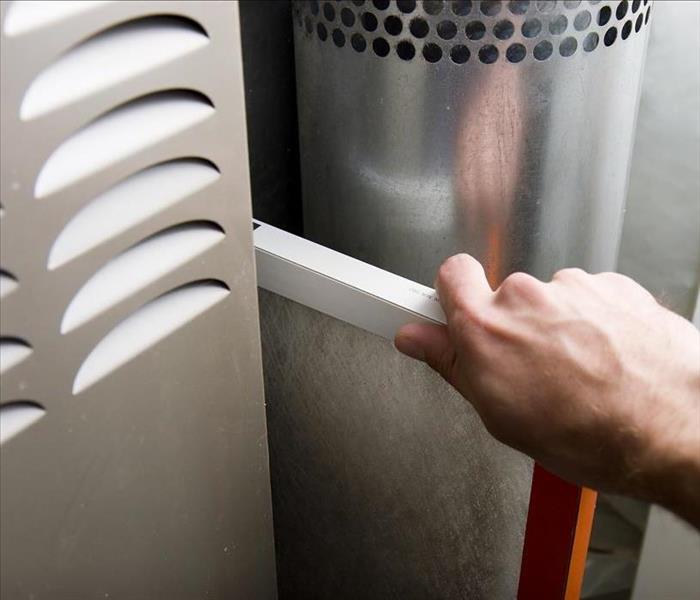 Simple maintenance on the heating system will prevent future problems in your Pitt County, NC, home.
Simple maintenance on the heating system will prevent future problems in your Pitt County, NC, home.
The heating system in your Pitt County, NC, home probably doesn't require a lot of attention to keep you and your family comfortable when the temperatures are low. However, regular furnace maintenance has several benefits:
- Prevents breakdowns
- Increased efficiency
- Lasts longer
- Saves money on utilities
- Improves cleanliness of the air
Many heating and cooling system problems can be traced back to dust or dirt buildup inside the unit. Proper maintenance ensures that your furnace runs efficiently for many years. It also helps you reduce the risk of furnace-related fires and the resulting costs of rebuilding and fire cleaning.
Get Rid of Dust and Dirt
There are many types of furnaces and some of the specifics of upkeep may vary, but there are several maintenance steps that are the same from one model to another. The first step is protecting your furnace from dirt. Prepare for winter weather by replacing or cleaning the filter, the blower, and the motor. When your furnace is in use, you should clean and inspect the filter once a month. If you find that the filter is clogged, replace it immediately. Use a vacuum or a soft duster to remove dirt, dust, and debris from the blower and the motor.
Keep the Vents Clean and Clear
Your running furnace blows warmed air through the vent system of your home. If any vents are blocked by dirt or furniture, the furnace must work harder to keep your rooms warm. Keeping the vents clear is an important part of routine maintenance and a good way to prevent the need for fire cleaning. If you have a gas furnace, it's critically important to keep the exhaust flue clean, clear, and unobstructed.
Pay Attention to Your Ductwork
Cleanup of the vents often begins at the registers, but it shouldn't end there. Make sure that all registers are free of paper, toys, hair, and dust. Once you've done this, remove the register and use your vacuum to clear debris out of the ductwork. If you've done any reconstruction or if your home has been affected by fire damage, for example, it's a good idea to contact professionals with experience in fire and smoke cleaning.
Improve Your Home's Envelope
Reduce the load on your furnace by improving your home's envelope. You can do this by locating areas of your home that allow heat to escape, and seal these leaks or add insulation. When you prevent heat loss, the furnace doesn't have to work as hard to keep your home at a comfortable temperature. If you aren't sure how to find areas where heat leaks out, contact a heating professional with cameras and other equipment.
Keep Routine Maintenance on Your Schedule
It isn't difficult to keep your furnace and heating system running efficiently, and it shouldn't take you much time. The best time to complete routine maintenance is before cold weather settles in, and you'll have the best results if you continue through the months of cold weather. Remember that the effort you put into keeping your furnace clean is also an important way to avoid serious fire damage and professional fire cleaning services.
Top Things You Should Throw Away After a Fire
5/28/2021 (Permalink)
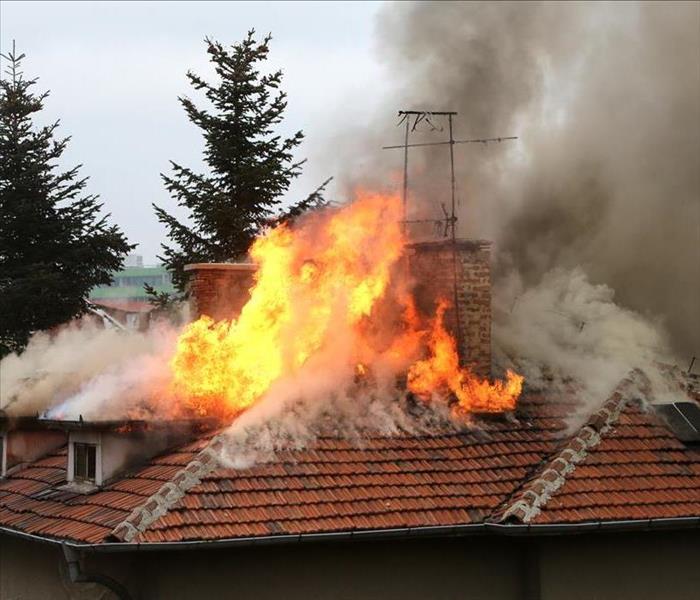 A home fire can be devastating.
A home fire can be devastating.
After a fire, you might want to keep as much of your old life as you can. Although many things can be cleaned, there are a few that you absolutely have to throw away after a fire. Some things are too damaged by heat, while others may spoil or be contaminated from chemicals released during the fire. You need to carefully consider what you should keep and what should be tossed out.
4 Top Things to Throw Away After Suffering Fire Damage
Anything Exposed To Chemicals
When certain materials burn, they release chemicals. This includes items like:
- Plastics
- Nonorganic fibers
- Wiring
You should toss out anything that is in or near plastic that has been exposed to high heat. This means you should get rid of most nonperishable foods, things in plastic containers, and anything containing dangerous chemicals.
Clothing, Rugs and Furniture
If you have a professional fire cleanup company in Greenville, NC, they might be able to save some of these articles. Although many can be cleaned, the smoke smell and fumes do not come out of everything.
Perishable Foods
Although perishable foods may seem like something you can keep, they are something you definitely should throw away. This includes anything that you plan on putting into your body. Not only can these foods be contaminated, but the heat might also make them spoil as well. This is especially true if your refrigerator suffers fire damage.
Medicine, Makeup and Toiletries
Medicine, makeup and toiletries are other things in your home that will spoil when exposed to heat. Medicine may become ineffective at best and become toxic at worst. When dealing with fire damage, it is better to be safe than sorry. Even things like shampoo and conditioner turn bad when they've been heated.
After a fire, it can be difficult to determine exactly what is damaged and what is not. It is always better to play it safe and throw away items that may be a problem.
Keep Your Greenville, NC Pets Safe From A House Fire
10/6/2020 (Permalink)
 Keep your playful puppies and kittens happy and safe with a fire emergency plan.
Keep your playful puppies and kittens happy and safe with a fire emergency plan.
Having an emergency plan is highly recommended, even for our four-legged friends. Do you know how to help your pets in a time of emergency? As a pet lover and owner in Greenville, NC, planning out what do and how to escape in the event of something like a fire is crucial for your animals’ safety.
Planning:
While discussing emergency plans with your family members, be sure to bring up pet preparations.
A few suggestions would be to:
- Relocate your pet cages and beds so they are near exits
- Denote what and how many pets are in your home on an easily visible window or door so that firefighters are aware they may still be on the premises.
- Provide names, descriptions, favorite hiding spots and other relevant pet information.
Practice:
Make sure to practice emergency procedures and have children attempt to remove the pets. Use caution and be certain to illustrate how important it is that they should never put themselves in harm's way. If they cannot get to the animal in a timely fashion, it's best to vacate and let the professionals look for them.
- Keep leashes, collars and carriers near an exit, if possible.
- Consider how you might be able to help your pets ahead of time; you don’t want to have to figure everything out during a fire.
Think bout potential hazards:
As it turns out, man’s best friend is also a leading cause of house fires. Animals don’t understand safety measures or risk assessment, so we have to do our best to remove any risks from the equation. Chief among these risks are candles. While they add a nice touch to a living space, they are not so nice when knocked over from a pet in pursuit of their favorite toy. Depending on the style of your stove, knob protectors are another great consideration to stop unwanted usage. Removing access from a room is more difficult for certain animals, but getting a pet or child gate can help create safe zones for your pet.
Pets are like loved ones for so many of us. Be sure to include considerations for their safety when discussing emergency fire plans with your family. With just a little forethought, organizing and change, you can create an actionable plan to keep everyone safe. Then, your favorite local fire restoration company can happily work to restore any damages knowing you’re safely cuddling with your four-legged friend.
Fire Damage To Your Greenville, NC Business
1/27/2020 (Permalink)
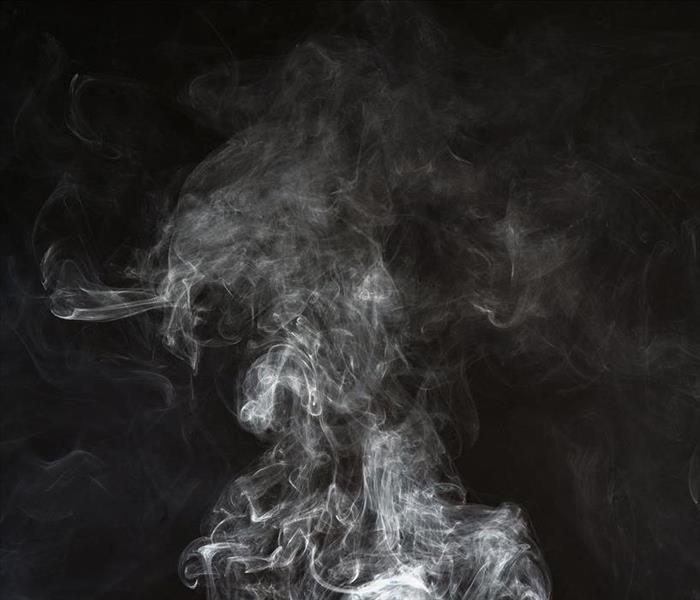 Smoke can be one of the most damaging secondary effects of a fire.
Smoke can be one of the most damaging secondary effects of a fire.
When a fire hits your Greenville, NC business, the often surreal experience can make the reality of the situation hard to digest. Extensive damages, temporarily closing down your business and trying to find outside assistance to get you back on your feet are just a few of the things that will likely cross your mind.
Fire damage remediation is a much more complex task than many realize: Ensuring the rebuild process goes smoothly, making sure insurers are satisfied with all service providers providing reliability as a constant and of course, repairing damages. Serious planning and correct implementation are crucial for a successful fire damage remediation. SERVPRO of Pitt/Greene Counties offers professional restoration services with this in mind to help make the process as smooth and pain-free as possible.
Our expert staff have seen numerous types of fire damages in their decades of collective experience. Even water infiltration that often occurs as secondary damage from fire-fighting measures are considered when we head out to help. This is tremendously helpful as our IICRC certified technicians understand that time is of the essence when dealing with water related damages.
The SERVPRO experience attempts every effort to get your business back up and running as quickly and smoothly as possible. From the start of the job to the finish, we will work diligently to help you through a fire damage.
Helpful Natural Gas Tips for your Greenville, NC Home
7/10/2019 (Permalink)
 Unlit gas stoves are a common source of the scent of gas.
Unlit gas stoves are a common source of the scent of gas.
The scent of natural gas can be alarming—rightfully so—here are some safety tips you can use to figure out what to do:
- If you have a gas stove, make sure it is off
- Help ventilate quickly by opening any doors and windows you can
- Minimize usage of electricity as much as possible; use battery operated lights
- Exit the premises and contact your local fire department
- If you know how and it is safe to do so, shut off your gas meter
Typically, most homes have a gas meter located somewhere outside that runs in to the house. This allows you to shut off all gas to your home in case of such an emergency, giving professionals the opportunity to investigate and determine where the gas may be coming from without as much of a risk for fire or explosion.
In most cases, all that is needed is a wrench. Preemptively seeking out your gas meter and understanding how to safely shut it off ahead of time can be crucial.
Prepare contacts in case of an emergency
If your home is affected by fire or you believe there may be a gas leak and you can’t quickly find its source, evacuate and call 911.
Most fire departments can shut gas off at the source if you haven’t had the opportunity to find it yourself. If there is a fire, hopefully your first-responders can extinguish it before any major damages—but worry not, SERVPRO of Pitt/Greene counties can help bring you back to preloss conditions no matter the size of job.
Cooking Safety Tips for Greenville, NC Residents
1/25/2019 (Permalink)
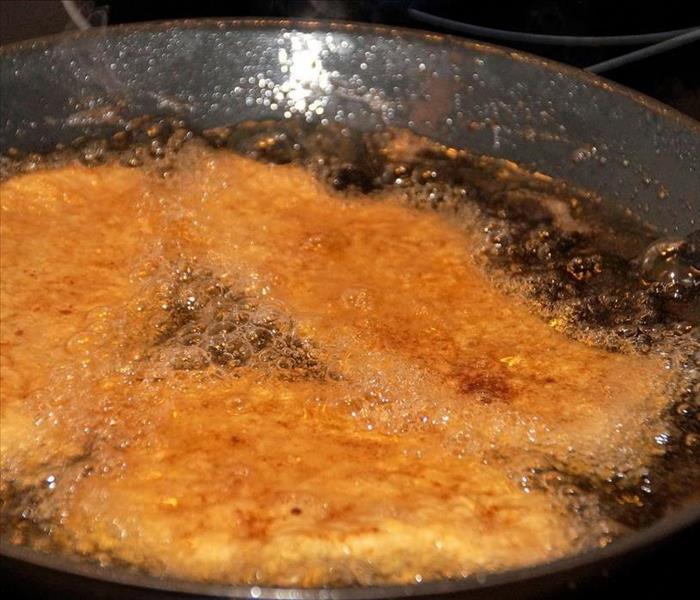 Frying is one of the most frequent causes of home cooking fires.
Frying is one of the most frequent causes of home cooking fires.
With cooler temperatures outside, many of us choose to stay inside and cook something new and exciting to pass the time. While generally a great idea, be mindful that cooking fires are the number one cause of home fires in the united states. To stay on the safe side, let’s take a moment to learn some more about this kind of danger and how you can prevent it.
To start, let’s take a look at the numbers: According to the National Fire Protection Association (NFPA), cooking accounts for about 47% of home fires, 20% of fire-related deaths and 45% of the fire-related injuries reported across the country each year.
Scary though these figures may be, there are many steps you can take to prevent these kinds of fires. As simple as it sounds, monitoring what you cook can be tremendously helpful: the NFPA states that nearly one-third of kitchen fires happen when the person cooking leaves the equipment they’re using unattended. If you’re using the oven, just be sure to check in on it regularly!
Also, be sure to keep oven mitts, plastic/rubber utensils, towels, paper products and other flammables away from heat—they can start a fire just as easily as burnt food!
Lastly, be sure to:
- Always stay in the kitchen when frying.
- If you see smoke coming off the food you’re frying, turn off the burner or safely remove the pan from the burner. Smoke is a sign the oil is too hot.
- Slowly heat the oil to the temperature you need.
- Add food to oil gently, laying it away from you so that it does not splatter.
- Always keep a lid beside your pan. If the pan does catch fire, cover it with the lid and turn off the banner. Let the oil cool before removing the lid again.
- NEVER put water on a grease fire. If a fire starts to spread, leave the house immediately and call 911.
Of course, there is always a chance that even with the best preparation, unforeseen circumstances can happen. Just remember, if you or someone you know is in need of professional cleanup or restoration services, our 24/7 emergency crews here at SERVPRO® of Pitt/Greene Counties are #HereToHelp. For questions or information, give us a call at: (252) 329-7205, or visit our website.
How we help Greenville, NC residents after a fire
1/2/2019 (Permalink)
What to do
If you find yourself wondering what to do after a fire occurs, getting in contact with the available 24/7 experts here at SERVPRO (252-329-7205) can help you quickly get on the path of restoring your home. Time can be of the essence in such situations, as often times the heat from a fire can damage your home’s structure, leading to further damage from exposure to outside elements. Firefighting methods can also cause water damage—thankfully we here at SERVPRO are more than ready and equipped to help.
What we can do to help
Depending on the level of damage, there are several steps we take to get you back in your home. The first thing we do is come and evaluate what areas need what services. Typically, firefighting methods can leave extensive water damage, which we are also well equipped to handle. Once a plan has been made, we can begin removing any materials which have been damaged beyond repair. This can be walls, ceilings, flooring, personal goods and more—we do it all! Finally, we can begin cleaning your home and items to remove stubborn soot stains and the persistent scent of smoke.
Here to help
The professional restoration services available at your locally owned SERVPRO® of Pitt/Green & Craven/Pamlico counties are available 24 hours a day, seven days a week if you or someone you know is in need of expert Fire & Water – Cleanup & Restoration™ services. Give us a call at: (252) 329-7205. #LikeItNeverEvenHappened
Fire Preparedness for Greenville, NC Residents
12/12/2018 (Permalink)
Greenville, NC residents, do you have a fire escape plan in case of an emergency? Being prepared and having a plan of action could make all the difference in case of an emergency. Here are some tips to help.
Protective Equipment
Having properly operational smoke detectors in your home can give you crucial time to respond to a fire. Be sure to change their batteries on a frequent basis.
If you keep a fire extinguisher in your home, it is important to periodically check its pressure levels to ensure functionality. Keeping the right type of extinguisher nearby can be another important factor; for a list of the different types of extinguishers and how best to use them, click here.
Have an Escape Plan
Planning out what to do in an emergency with your family every few months helps to keep everyone ready and aware. Going through your home looking at exits together and discussing where to meet if you get separated is a great way to stay prepared.
Emergency Contacts
Keeping a list of family doctors, medicines and medical information such as allergies can help responders provide you with the best possible care. Having family members in your emergency contacts can also enable you or others to quickly get in touch with those you love.
What to do After a Fire
Even if a fire doesn’t directly damage a large portion of your home, the smoke and soot as well as any water dispersed by the fire department may leave you needing professional restoration services. Of course, we here at your locally owned SERVPRO® of Pitt/Green & Craven/Pamlico counties are available 24 hours a day if you or someone you know is in need of expert Fire & Water – Cleanup & Restoration™ services.
Are you Deep-Frying your Turkey this Thanksgiving?
11/3/2017 (Permalink)
With the popularity of turkey frying increasing every year, people are at risk for fryer-related fires and injuries. U.S. fire departments are responding to more than 1,000 deep fire related incidents each year. According to the National Fire Protection Association deep fryer fires result in more than $15 million in property damage each year. Here are some rules to follow when deep frying a turkey.
Don’t Deep Fry a Frozen Turkey Frozen turkeys are full of moisture. Make sure your turkey is completely thawed out because water and hot oil don’t mix well.
Don’t Let Oil Get Too Hot If you see your oil smoking, it is too hot. When oil gets around 400-425-degrees it can catch on fire by itself. So, when deep frying a turkey most oils should stay around 350-degrees.
Don’t Use Too Much Oil When deep-frying a turkey a common mistake people make is putting too much cooking oil in their pot. Overfilling your pot can result in the oil spilling over into the flame on the burner. If you need to figure out how much oil you need try putting your turkey in an empty pot, fill the pot with enough water to cover the turkey. Once you remove the turkey mark the water line.
Don’t Deep Fry Indoors You should never deep-fry a turkey in your house, garage or on a deck. You should always deep fry a turkey in a yard away from anything that’s flammable.
Hopefully, this Thanksgiving will go smoothly. However, if a fire does occur and your Greenville home suffers fire damage, it can be especially devastating. In addition to the fire and smoke damage, your property may have substantial water damage from firefighting efforts. SERVPRO of Pitt / Greene Counties has the specialized fire and water damage equipment and expertise to help you through this tough time. Call Us Today – (252) 329-7205
How to Prevent and Fight Grease Fires!
10/3/2017 (Permalink)
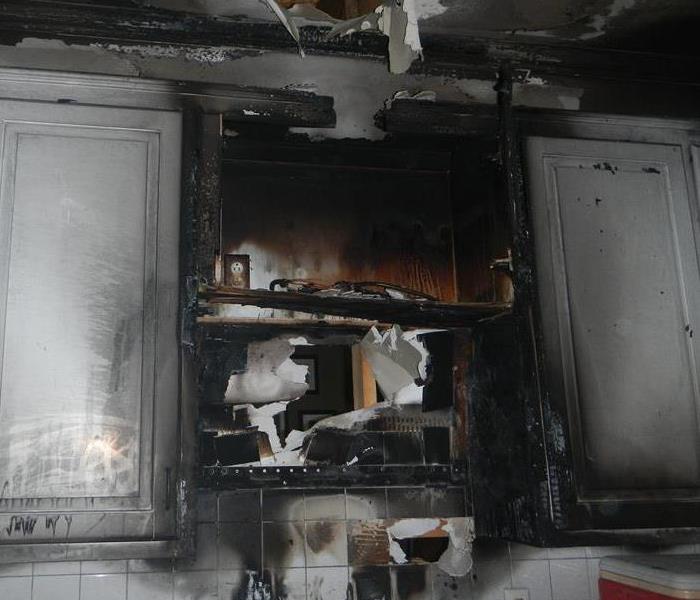 Kitchen Fire
Kitchen Fire
Did you know that Thanksgiving, Christmas Eve, and Christmas are the 3 biggest days of the year for grease fires? Grease fires occur when cooking oil becomes too hot. First the cooking oil starts to boil, then it starts to smoke followed by a fire. A grease fire is different from a regular fire, so the way you handle it is very important.
How can you prevent grease fires?
- Keep an eye on the food you are cooking regularly. Do not leave it unsupervised for extended periods of time.
- When frying, grilling, boiling, or broiling food, stay in the room.
- Do not leave anything that may catch fire near the stove top.
- Be extremely careful when placing food into hot grease.
- DO NOT ADD WATER TO GREASE.
If your oil does catch fire, complete the following:
- Turn the Heat Off
- Cover the Pot with a Metal Lid - Fire cannot exist in the absence of oxygen. With the lid on (and the heat off), the fire should quickly consume all the oxygen and put itself out. Use a metal lid since glass will shatter.
- Use Baking Soda - When heated, baking soda releases carbon dioxide with smothers out the flames oxygen.
- Spray the Pot with a Class B Dry Chemical Fire Extinguisher – For more information about fire extinguisher types, click here.
- Get Out and Call 911 - If the fire does break out of control, don't try to be a hero. Get out and find a phone to call 911.
With any luck, you'll never have to deal with a grease fire. However, if you do find your Greenville home or business suffering from grease fire damage, it can be especially devastating. SERVPRO of Pitt / Greene Counties has the specialized fire and water damage equipment and expertise to help you.
Have Questions about Fire, Smoke, or Soot Damage? Call Us Today – (252) 329-7205
 Fire damage in Greenville, NC can be devastating. Call the professionals at SERVPRO of Greenville to help!
Fire damage in Greenville, NC can be devastating. Call the professionals at SERVPRO of Greenville to help!



 24/7 Emergency Service
24/7 Emergency Service













